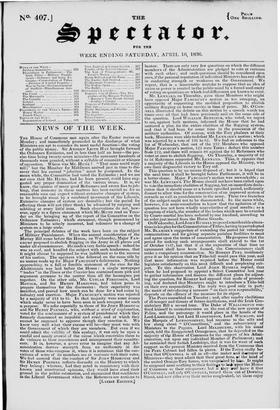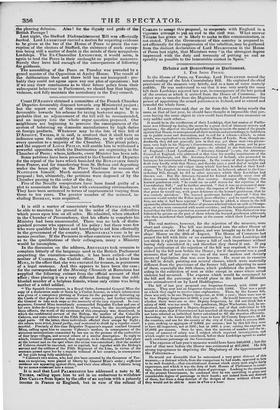NEWS OF THE WEEK.
THE House of Commons met again after the Easter recess on Monday ; and immediately proceeded to the discharge of what Ministers are apt to consider its most useful function—the voting of the public money. Sir ANDREW LEITH HAY brought forward the Ordnance Estimates, and in less than half an hour—the pre- cise time being twenty-seven minutes—the necessary hundreds of thousands were granted, without a syllable of comment or whisper of opposition. Where was Mr. HumE ? "That none could truly tell ;" but the Member for Middlesex arrived just in time to dis- cover that his annual " jobation " _must be postponed. In the mean while, the Committee had voted the Estimates ; and we are not sure that Mr. HUME, had be been present, could have sug- gested any proper diminution of' the various items. It is, we know, the opinion of many good Reformers and sworn foes to job- bing, that economy in these matters has been carried as far as reasonable men can expect without extensive changes of system, to be brought about by a combined movement of the Liberals. Extensive changes of system are desirable ; but the period for -effecting them will not (they think) be advanced by carping and nibbling at every little' item. Such observations do not, how- -ever, apply to a figure statement which Mr. HustE read on Tues- day on the bringing up of the report of the Committee on the Ordnance Estimates; whicli statement, though pronounced by Ministers to be utterly incorrect, had reference to a change of system on a large scale. The principal debates of the week have been on the subject of Military Punishment. When the annual consideration of the Mutiny Bill came before the House, on 'Wednesday, Major FAN- COURT proposed to abolish flogging in the Army in all places and under all circumstances. He made a very feeble speech : indeed he was so cool, and handled the subject with such tenderness, that it might almost be supposed he was indifferent as to the success of his motion. The speakers who followed on the same side by no means made up for Major FANcOuRT's deficiencies. Nothing approaching to a full or forcible statement of the case for the Abolitionists was laid before the House : a single newspaper " leader" in the Times or the Courier has contained more pith and argument germane to the matter than all the harangues put together. On the other side, Mr. CUTLAR FERGUSSON, Lord HOWICK, and Sir HENRY HARDINGE, had taken pains to prepare themselves for the discussion : their superiority was manifest, and proved how much can be done for a bad cause by industry and exertion. Major FANcOuRT's motion was rejected by a majority of 212 to 95. In that majority were some names which ought never to have been seen in such company for such a purpose. We refer especially to those of Sir JOHN HOBHOUsE And Sir HENRY PARNELL, who, without a word of explanation, voted for the continuance of a system of punishment which they formerly denounced as impolitic and cruel, and of which they cannot be supposed to approve though they sanction it. We
know very well what their excuse will be—they must vote with the Government of which they are members. But even if we could admit the validity of this apology, it can only be upon a candid and manly avowal of the cause which constrains them to do violence to their consciences and misrepresent their constitu- ents. It is, however, a gross error to imagine that any Ad- ministration derives strength from an uniformity in the votes of those who compose it, when it is notorious that the con- victions of some of its members are at variance with their votes.
We feel assured that the conduct of Sir JOHN HOBMOUSE and Sir HENRY PARIVELL reflects discredit on the Ministry to which they belong ; whereas, had they acted in consistency with their known and unretracted opinions, they would have stood their ground in the public estimation, and augmented that confidence in the Liberal Government which the Reformers are anxious to
[LATEST EDITION.]
bestow. There are only very few questions on which the different members of the Administration are pledged to vote at variance with each other; and such questions should be considered open ones, if the personal reputation of individual Ministers has any effect in conferring strength or weakness on the Government. We repeat, that is a lamentable mistake to suppose that an idea of union or power is created in the public mind by a forced uniformity of voting on questions on which real differences are known to exist.
Mr. LENNARD, on Thursday, gave those Members who might have opposed Major FANCOuRT's motion as too sweeping, an opportunity of supporting the modified proposition to abolish military flogging on home service in time of peace. Mr. O'CON- NELL illustrated the debate on this motion by a speech worth ten times over all that had been previously said on the same side of the question. Lord WILLIAM BENTINCK, who voted, we regret to see, against both motions, informed the House that he had matured a plan for the entire abolition of the flogging system, and that it had been for some time in the possession of the military authorities. Of course, with the Tory phalanx at their back, Ministers were able to defeat Mr. LENNARD S motion; which was rejected by a vote of 135 to 62. We find on reference to the list of Wednesday, that out of the 212 Members who opposed Major FANcOuRT's motion, 124 were Tories : deduct this number from 212, and there will remain 88 against the 95 Reformers who voted at once to abolish flogging. On Thursday, a majority of 62 to 56 Reformers supported Mr. LENNARD. Thus, it appears that a majority of the Liberals in the House opposed the Ministry, who owe their disgraceful victory to Tory aid. This question is by no means disposed of; but it is hoped that the next time it shall be brought before Parliament, it will be in a better shape. Major FANcOuRT's motion was unworkable ; so was Mr. LENNARD's. The House should not have been called upon to vote the immediate abolition of flogging, but an immediate decla- ration that it should cease at a future specified period, sufficiently distant to allow time for the construction of an improved system of rewards as well as punishments in the army. These two branches of the subject ought not to be disconnected. In the mean while, however, it is some consolation to know that the agitation of the question has not been wholly unproductive of good results ; as a symptom of which, the number of the lashes which may be awarded by Courts-martial has been reduced by one hundred, according to an order just issued from the Horse Guards. OnWednesday, Lord J OH N RUSSELL proposed considerable altera- tions in his plan for the Commutation of Tithes, having in part adopted Mr. BLAMIRE'S suggestion of extending the period for voluntary commutations and for giving separate parishes facilities to meet and agree upon the terms of commutation. He proposes that the period for making such arrangements shall extend to the 1st of October 1837, but that if at the expiration of that time no agreement shall have been formed, the Commissioners shall make a compulsory commutation. Sir ROBERT PEEL insidiously gave it as his opinion that no Tithe-bill would pass this year, and that more information was required before the House could legislate satisfactorily on this most difficult and perplexing sub- ject. To this observation Lord JOHN RUSSELL replied, that when he had proposed to appoint a Select Committee last year to gather information and discuss the different plans for adjust- ing the question, Sir ROBERT had opposed that mode of proceed- ing, and declared that Ministers ought to introduce a Tithe-bill on their own responsibility. The reply was good only in part: the merit of introducing a measure " on their own responsibility," depends on the efficacy of the measure for its object.
The Peers assembled on Tuesday ; and, after sundry ebullitions of ill-temper and threats of future mutilations, read the Irish Con-
stabulary Bill a second time. The Duke of WELLINGTON con-
fined himself to animadversions on the cost of the new system of Police, and the patronage it would place in the hands of the
Lord-Lieutenant; but Lord HADDINGTON, Lord WICKLOW, and the Marquis of LONDONDERRY, bad recourse to the silly and low slang about " O'Connellism," and the subserviency of Ministers to the Papists. Lord MELBOURNE, with his usual spirit, told the disappointed Orangemen, that he depended on the
majority of the House of Commons for the support of his Admi- nistration, not upon any individual Member of Parliament; and he reminded their foolish Lordships, that it was for want of such support as the present Ministry received from the Commons that
the PEEL Cabinet had fallen to pieces. If the Tories really be- lieve that O'CONNELL is all in all—the maker and destroyer of Ministers—they must admit that their great hero, at the head of the united Orange-Tory forces, was vanquished by hibu. It might be supposed more soothing to their feeliuss to laqk upon the House
of Commons as their conqueror; but they Will have it that
O'CONNELL, and only O'CONNELL, turned them out of Downing Street, and now rides over their necks rough-shod, let them enjoy
the pleasing delusion. Alas I for the dignity and pride of tha British Peerage I
Last night, the Stafford Disfranchisement Bill was effectually barked. Lord LvNDHURST carried a motion for requiring evidence to be given at the bar of the House of Peers to prove the cor- ruption of the electors of Stafford, the existence of such corrup- tion being still a matter of doubt in the minds of their scrupulous Lordships. The Ex-Chancellor LYNDHURST, it would seem, is again to lead the Peers in their onslaught on popular measures. Surely they have had enough of the consequences of following his guidance.
The assembling of the Peers on Tuesday was preceded by a grand muster of the Opposition at Apsley House. The result of the deliberations then and there held has not transpired : pro- bably they could not agree upon any one plan of operations : but if we may draw conclusions as to their future policy from their subsequent behaviour in Parliament, we should fear that bigotry, violence, and folly maintain the ascendancy in the Tory council.



























